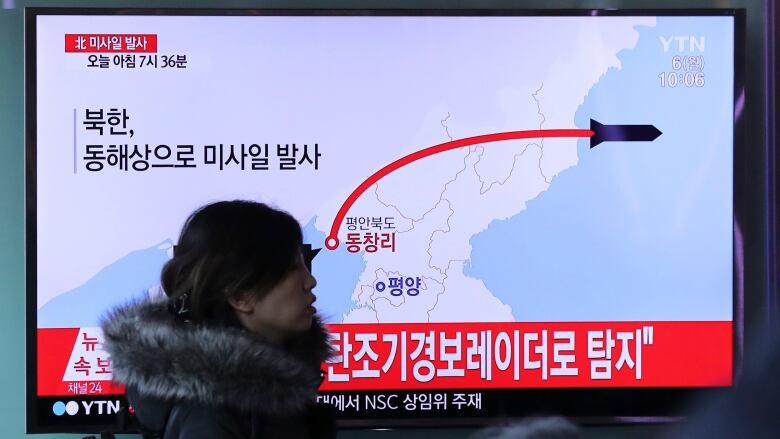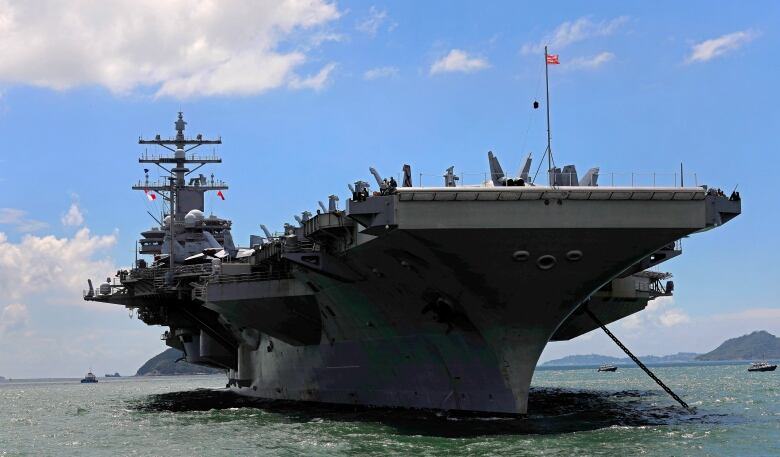North Korea warns of nuclear war at 'any moment'
U.S., Japanese diplomats meet to discuss crisis as anti-Trump leaflets appear in the South

The United Statesis not ruling out the eventual possibility of direct talks withNorth Korea, Deputy Secretary of State John Sullivan said onTuesday, hours after Pyongyang warned nuclear war might breakout at any moment.
Talks between the adversaries have long been urged by Chinain particular, but Washington and its ally Japan have beenreluctant to sit down at the table while Pyongyang continues topursue a goal of developing a nuclear-tipped missile capable ofhitting the U.S.
"Eventually, we don't rule out the possibility, of course, ofdirect talks," Sullivan said in Tokyo after talks with hisJapanese counterpart,Shinsuke Sugiyama.
"Our focus is on diplomacy to solve this problem that ispresented by [the North]. We must, however, with our allies, Japanand South Korea and elsewhere, be prepared for the worst shoulddiplomacy fail," he said.
Sugiyama, briefing reporters separately, reiterated Japan's support for U.S. President Donald Trump's policy of keeping all options, but stressed the need for a diplomatic solution by bolstering co-operation among Japan, U.S. and South Korea, as well as via co-operation with China and Russia.

In Washington, State Department spokespersonHeather Nauert highlighted U.S. diplomatic efforts by Sullivan and others to pressure North Korea to give up its weapons programs by encouraging implementation of international sanctions.
Nauert told a regular briefing that sanctions were choking off money supply to North Korea and it was feeling the effect, but even so Pyongyang was "not showing that they are anywhere near desiring to have talks."
"We hope that this diplomatic approach will be successful in the end," Nauert said, while adding of Secretary of State Rex Tillerson,"he's got to be the most optimistic guy in the U.S. government."
- North's nuclear tests causing earthquakes, experts say
- ANALYSIS |End of a special relationship? China looks at North Korea with frustration and even fear
Tensions have soared following a series of weapons tests byNorth Korea and a string of increasingly bellicose exchangesbetween Trump and North Korean leader KimJong-un.
Leaflets apparently from North Korea calling Trump a "maddog" and depicting gruesome images of him have turned up acrosscentral Seoul in recent days, adding an unusually personalelement to North Korean propaganda.
"The situation on the Korean peninsula, where the attentionof the whole world is focused, has reached the touch-and-go pointand a nuclear war may break out any moment,"KimIn-ryong, North Korea'sdeputy UN ambassador, told a UNGeneral Assemblycommittee on Monday.
"As long as one does not take part in the U.S. militaryactions against the DPRK [North Korea], we have no intention touse or threaten to use nuclear weapons against any othercountry," according to Kim's prepared remarks for the discussionon nuclear weapons. Kim did not read that section out loud.
South Korea and the U.S.began weeklong joint naval drills in the waters around the Korean peninsula on Monday, involving about 40 ships from both militaries, including the nuclear-powered USS Ronald Reagan aircraft carrier, South Korea's defence ministry said.

North Korean state media said Tuesday the allies' "desperate efforts" to block North Korea's advance only showed it should continue its nuclear program"to the last."
Asked about the North Korean envoy's warning of nuclear war, Chinese Foreign Ministry spokespersonLu Kang said it would not be in anyone's interest.
"China still hopes that all parties, in this situation where things on the Korean peninsula are highly complex and sensitive, can exercise restraint and do more to benefit the lowering of tensions in the region," Lu told a daily news briefing.
Scrambling for cash
The UNSecurity Council has unanimously ratcheted upsanctions on North Korea over its nuclear and ballistic missileprogramssince 2006.
The most recent UNsanctions banned exports of coal, ironore and seafood, aimed at cutting off one-third of North Korea'stotal annual exports of $3 billion.
Experts say North Korea has been scrambling to findalternative sources of hard currency to keep its economy afloatand to advance its weapons programfurther.
North Korea's Lazarus hacking group was likely responsiblefor a recent cyber heist in Taiwan, cyber-security firm BAESystems said on Monday.
BAE Systems and other cyber firms have previously linkedLazarus to last year's $81-million cyber heist at Bangladesh'scentral bank.
North Korea had also recently allowed citizens as young as12 to bet on local horse races for the first time, state newsagency KCNA reported.
Gamblers in the reclusive and tightly controlled state had previously risked three years hard labour, but thegrowing importance of private markets meant more people hadmoney to spend on leisure, experts said.
Lee Sang-keun, a researcher at the Institute of Unification Studies at Seoul's Ewha Womans University, said wealthy North Koreans had to pay for such activities with Chinese or U.S. currency.
"Many North Koreans make lots of money from the market, dine at hamburger restaurants and go shopping, all of which help fatten regime coffers. That's part of the reason why the regime still has some financial latitude, despite international sanctions," Lee said.
With files from The Associated Press












_(720p).jpg)


 OFFICIAL HD MUSIC VIDEO.jpg)
.jpg)



























































































